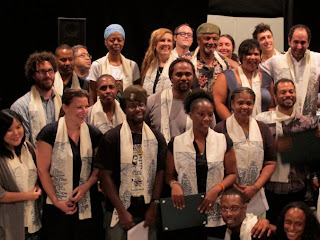EMEAC officially receives donation of First UU Complex; announces opening of Cass Community Commons
August 22, 2011
DETROIT – The East Michigan Environmental Action Council (EMEAC) will officially assume responsibility for operation of the First Unitarian Universalist Complex on August 15 after the First UU Board formally donated the facilities to EMEAC in July. EMEAC’s plans for the complex include the creation of a Cass Community Commons consisting of fellow social justice minded community organizations and environmentally retrofitting the facilities while continuing to allow the First UU congregation full use of the worship and meeting facilities.

“Our vision is to transform the UU space into a multi-use facility and Detroit grassroots organizing hub,” said EMEAC Director Diana Copeland. “This Cass Corridor Community Commons space will embody the principles and values of the Unitarian Church and our environmental and social justice principles.”
Not only will the facility be used for First UU services and EMEAC administrative office space, it will also house several grassroots organizations which are partnered with EMEAC.”
Entrepreneurial ventures by collaborative partners in addition to meeting space for grassroots events and activities will also be accommodated. Some current tenants at the facility like the Sugar Law Center for Social and Economic Justice will remain at First UU. They will be joined by EMEAC partners like the Detroit Grassroots Cultural Arts Center, The People’s Kitchen Detroit, The Detroit Media Arts Cooperative, Whole Note Healing Space, and Fender Bender Detroit.
“We are creating a common space for the movements around social justice, food justice, environmental justice and digital justice to educate, strategize, and strengthen the underrepresented and unrepresented voices of our youth, elders, communities of color, and those that differ in their orientation and abilities,” said EMEAC Associate Director Lottie Spady. “Maintaining the structural expenses of a large building is a challenge, but its one that has been anticipated and we are planning accordingly. There will be many opportunities for the community to support this effort by way of events, campaigns, and outreach efforts. We hope that going forward community members would please consider connecting with EMEAC and First UU to share resources around the maintenance of this vital community resource.”
Experts in environmental retrofitting has been consulted to meet the task of environmentally retrofitting the facilities. We Want Green Too will begin the process by conducting an energy audit and complete building inspection. That information will be used in determining the specific renovations needed. EMEAC will then turn to its “green team” of experts specializing in green design and construction. The team includes Ken Moody & Associates, Community Green Builders and We Want Green Too along with individual experts like Architect Carlos Nielbock, green construction professionals Mutope A’Alkebu’lan, Cornelius Williams and Chazz Miller.
Further retrofits such as insulation, window fitting, heating, solar and geothermal options will be considered as well.
“What excites me most are the many opportunities available to us now because of the facilities in the building,” said EMEAC Associate Director Ahmina Maxey. “The building has so many spaces that can be put to great use through the Cass Corridor Community Commons and the programming, events, and activities that will be offered. These include a theater, kitchen, common room, etc.
“I feel like we are bringing more life back into the walls of First UU. The building has such a rich heritage and presence, being a place of celebrations, weddings, services, youth events, etc. and that energy is still present and reverberates in the walls. Although some of this activity may have slowed as of late, I'm excited to be blessed with the opportunity to bring this energy back to the building through our work.”
The EMEAC team sees the establishment of the Community Commons at First UU as a critical move toward ensuring that current residents and community-based organizations of the city have both a presence and a voice in the face of the rising tide of gentrification sweeping over what is now called Midtown.
“This effort is made even more significant with the tide of gentrification that is flowing through the Cass Corridor, starting with its re-naming as "Midtown,” said Spady, a life-long resident of the city. “Businesses and entities that work specifically on behalf of the community, which stand to be displaced by these actions will be instrumental in the creation of economically sustainable areas. We are operating on the premise of community empowerment by lifting up the invisible capital that is deeply embedded in Detroit's history of resiliency, innovation, perseverance, and soul.”













